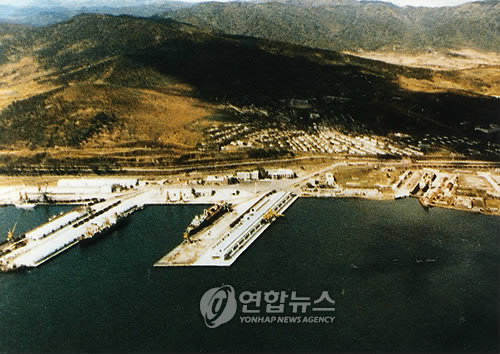China also given construction rights for power plants, airfields and a train-line.
DPRK and China agree to a $3 billion infrastructure construction contract

Front View of North Korea's Rajin Port wharves
China has secured long sought-after construction rights in the Rason Special Economic Zone (SEZ) and 50 year usage rights for the Zone's Wharves 4, 5 and 6.
China has also agreed to construct airfields and thermoelectric power stations within the Zone, as well as to construct a 55km railroad between the Chinese city of Tumen in Jilin province and the Rason SEZ.
According to multiple sources in Beijing and Seoul on the 15th of this month, China and North Korea have signed a $3 million infrastructure construction contract for the Zone, in order to stimulate the development of both the Rason SEZ as well as that of the Three Northeast Provinces of China (Heilongjiang, Jilin, Liaoning) from the end of next year.
It has been reported that China has agreed to first construct the 70,000 ton Wharf 4 for Rajin Port, as well an airfield able to service both cargo and passenger planes. They have also agreed to invest $3 billion into the construction of a Tumen-Rason SEZ trainline by 2020.
This contract was signed by North Korea's Joint Investment Commission and China's government, but both countries are avoiding releasing information on the deal to the public. A source has revealed that this deal was finalized following the death of former North Korean leader Kim Jong Il.
It has been reported that after China completes these first-stage investments, it plans to begin construction on Rason SEZ's Wharves 5 and 6.
While China had initially held the position that they could have no government-level investment for North Korea, their position seems to have changed somewhat following four repeated visits to China by Kim Jong Il in 2010 and 2011.
In the negotiation process, North Korea initially hoped that China would provide large-scale investment in the Hwagumpyong area between Sinuiju and the Chinese city of Dandong, but China greatly preferred to secure East Sea port access through the Rason SEZ in order to alleviate distribution problems in the Three Northeast Provinces.
China's Three Northeast Province region, blocked from access to the East Sea due to Russian and North Korean control of the water surface downstream of the Tumen river, suffers from extremely high distribution costs and is forces to rely on the constant and excessive use of the port facilities in Dalian and Dandong.
Because of this, China's central government pushed the 'Changchun-Jilin-Tumen Plan' to open up the North Korean ports of Rajin and Cheongjin in order to develop the Three Northeast Province region. After winning the bid for usage rights for Wharf 1 of Rajin port in 2008 and performing repair and extension work, China was able to gain a cargo handling capacity of 1 million tons a year.
However, as the details of the China-North Korean infrastructure contract are becoming known, there are concerns over the fairness of the deal as well as whether this will lead to the economic rights to the Rason Special Economic Zone being passed over to China entirely.
Source: (Seoul/Beijing - Yonhap News) Reporter Jo Jun-hyeong, Special Correspondent Cha Dae-un